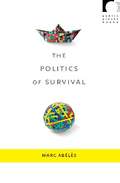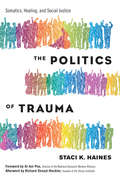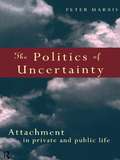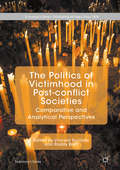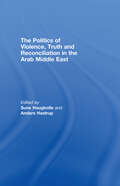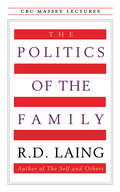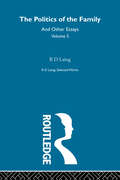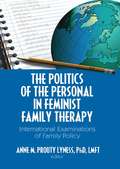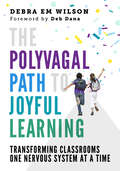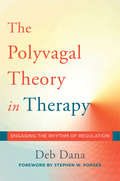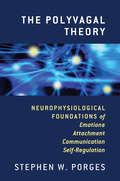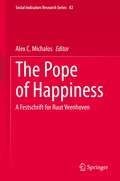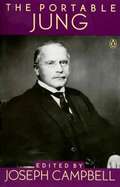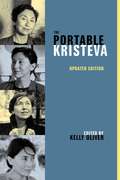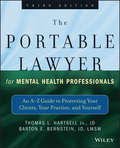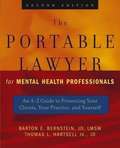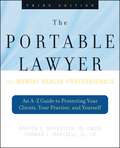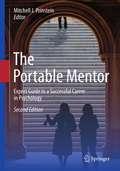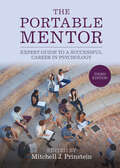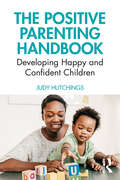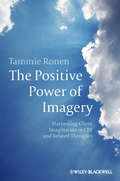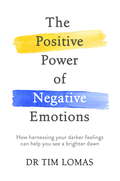- Table View
- List View
The Politics of Survival
by Marc AbélésIn this provocative analysis of global politics, the anthropologist Marc Abls argues that the meaning and aims of political action have radically changed in the era of globalization. As dangers such as terrorism and global warming have moved to the fore of global consciousness, foreboding has replaced the belief that tomorrow will be better than today. Survival, outlasting the uncertainties and threats of a precarious future, has supplanted harmonious coexistence as the primary goal of politics. Abls contends that this political reorientation has changed our priorities and modes of political action, and generated new debates and initiatives. The proliferation of supranational and transnational organizations--from the European Union to the World Trade Organization (WTO) to Oxfam--is the visible effect of this radical transformation in our relationship to the political realm. Areas of governance as diverse as the economy, the environment, and human rights have been partially taken over by such agencies. Non-governmental organizations in particular have become linked with the mindset of risk and uncertainty; they both reflect and help produce the politics of survival. Abls examines the new global politics, which assumes many forms and is enacted by diverse figures with varied sympathies: the officials at meetings of the WTO and the demonstrators outside them, celebrity activists, and online contributors to international charities. He makes an impassioned case that our accounts of globalization need to reckon with the preoccupations and affiliations now driving global politics. The Politics of Survival was first published in France in 2006. This English-language edition has been revised and includes a new preface.
The Politics of Trauma: Somatics, Healing, and Social Justice
by Staci HainesAn essential tool for healers, therapists, activists, and survivors of trauma who are interested in a justice-centered approach to somatic transformationThe Politics of Trauma offers somatics with a social analysis. This book is for therapists and social activists who understand that trauma healing is not just for individuals--and that social change is not just for movement builders. Just as health practitioners need to consider the societal factors underlying trauma, so too must activists understand the physical and mental impacts of trauma on their own lives and the lives of the communities with whom they organize. Trauma healing and social change are, at their best, interdependent. Somatics has proven to be particularly effective in addressing trauma, but in practice it typically focuses solely on the individual, failing to integrate the social conditions that create trauma in the first place. Staci K. Haines, somatic innovator and cofounder of generative somatics, invites readers to look beyond individual experiences of body and mind to examine the social, political, and economic roots of trauma--including racism, environmental degradation, sexism, and poverty. Haines helps readers identify, understand, and address these sources of trauma to help us bridge individual healing with social transformation.
The Politics of Uncertainty: Attachment in Private and Public Life
by Peter MarrisIn The Politics of Uncertainty Peter Marris examines one of the most crucial and least studied aspects of social relationships: how we manage uncertainty, from the child's struggle for secure attachment to the competitive strategies of multinational corporations. Using a powerful synthesis of social and psychological theory, he shows how strategies of competition interact with the individual's sense of personal agency to place the heaviest burden of uncertainty on those with the fewest social and economic resources. He argues that these strategies maximize uncertainty for everyone by undermining the reciprocity essential to successful economic and social relationships. At a time when global economic reorganisation is undermining security of employment, The Politics of Uncertainty makes a convincing case for strategies of co-operation at both personal and political levels to ensure our economic and social survival in the twenty-first century.
The Politics of Victimhood in Post-conflict Societies: Comparative And Analytical Perspectives (St Antony's)
by Roddy Brett Vincent DruliolleThis volume sheds new light upon the role of victims in the aftermath of violence. Victims are central actors in transitional justice, the politics of memory and conflict resolution, yet the analysis of their mobilisation and political influence in these processes has been neglected. After introducing and explaining the reasons for this limited interest, the book’s chapters focus on a range of settings and draw on different disciplines to offer insights into the interrelated themes of victimhood – victims, their individual and collective identities, and their role in and impact upon post-conflict societies – and the politics of victimhood – meaning how victimhood is defined, negotiated and contested, both socially and politically. Because it outlines a stimulating research agenda and challenges the view that victims are passive or apolitical, this interdisciplinary volume is a significant contribution to the literature and will be of interest to scholars from disciplines such as law, anthropology, political science, human rights, international studies, and to practitioners.
The Politics of Violence, Truth and Reconciliation in the Arab Middle East
by Sune Haugbolle and Anders HastrupIn the last five to ten years, pressure for political liberalisation, and the growth of civil society and independent media, inside Arab countries have prompted the debate about violent events in the postcolonial period. This book features studies of six Arab countries in which legacies of political violence have been challenged through various initiatives to promote "truth-telling" and transitional justice. The analysis departs from a liberal, teleological understanding of truth and reconciliation as a linear process from trauma through memory to national healing. Instead, the articles highlight how the interplay between state-orchestrated initiatives (such as Truth and Reconciliation committees and ministerial committees); civil society actors (including former political prisoners, investigative journalists and NGOs); and external actors (such as transnational NGOs, state sponsored dialogue initiatives, the UN and the EU) is creating a new political field. The book examines the extent to which this field challenges the Arab nation-state’s monopoly on history and violence, and asks whether public narratives of violence, memory and justice consolidate or challenge political legitimacy of current regimes. This book was published as a special issue of Mediterranean Politics.
The Politics of War Memory and Commemoration
by T. G. Ashplant Graham Dawson Michael RoperWar memory and commemoration have had increasingly high profiles in public and academic debates in recent years. This volume examines some of the social changes which have led to this development, among them the passing of the two World Wars from survivor into cultural memory. Focusing on the politics of war memory and commemoration, the book illuminates the struggle to install particular memories at the centre of a cultural world, and offers an extensive argument about how the politics of commemoration practices should be understood.
The Politics of the Dreamscape
by Seth RogoffThis book traces the intersection of dreams and power in order to analyze the complex ways representations of dreams and paradigms of dream interpretation reinforce and challenge authoritarian, hierarchical structures. The book puts forward the concept of the dreamscape as a pre-representational space that contains anarchistic attributes, including its instability or chaotic nature and the lack of a stable or core selfhood and identity in its subjects. The book situates this concept of the dreamscape through an analysis of the Daoist notions of the “transformation of things” and hundun (chaos) and the biblical concept of tehom (the deep). Using this conceptual framework, this book analyzes paradigmatic moments of dream interpretation along a spectrum from radical, anarchist assertions of the primal dreamscape to authoritarian dream-texts that seek to reify identity, define and establish hierarchy, and support coercive relationships between unequal subjects. The book’s key figures include William Blake, Robert Frost, Jacob and Joseph from Genesis, Sigmund Freud, Carl Jung, Jean Rhys, Franz Kafka, and the neurobiologist J. Allan Hobson
The Politics of the Family (The CBC Massey Lectures)
by R.D. LaingIn his 1968 CBC Massey Lectures R. D. Laing discusses how and why we value society's notions of family over our own. Using concepts of schizophrenia, R.D. Laing demonstrates that we tend to invalidate the subjective and experiential and accept the proper societal view of what should occur within the family. A psychoanalyst and psychiatrist, Laing worked at the Tavistock Institute of Human Relations. His books include The Self and Others and The Politics of Experience.
The Politics of the Family and Other Essays (Selected Works of R D Laing #Vol. 5)
by R. D. LaingOriginally published in 1969, based on the talks R. D. Laing gave in 1967 and 68, this book was intended by the author to evoke questions rather than provide answers. Using concepts of schizophrenia, R.D. Laing demonstrates that we tend to invalidate the subjective and experiential and accept the proper societal view of what should occur within the family.
The Politics of the Personal in Feminist Family Therapy: International Examinations of Family Policy
by Anne M. Prouty LynessAddress the issues vital for women and their familiesTo be most effective, family therapists need to understand precisely what policies are in place and how they influence families and their relationships. The Politics of the Personal in Feminist Family Therapy: International Examinations of Family Policy provides an interdisciplinary look at family public and social policies and the influence they have on families around the globe-all from a feminist perspective. Diverse international family policy experts discuss policies family therapists need to know covering gender, ethnicity, religion, and age, and the effects on women and their families.As international family public policy shifts and changes, women and their families&’ lives are altered in substantial and very personal ways. The Politics of the Personal in Feminist Family Therapy gives therapists a clear view of policies and diverse issues involving family policy, family relationships, and mental health. The book reveals the interaction between policy and practice, interdependence as a principle of child and family policy, ways to increase women&’s labor force participation without causing a fall in birth rates, and intergenerational equity debates around the world. Qualitative studies are presented detailing women&’s experiences of family policies&’ effects on their lives, including their resiliency in times of disruption and their viewpoints on life-altering events that are used to disempower them. Topics in The Politics of the Personal in Feminist Family Therapy include: the interaction of British social policy with feminist practice supportive rather than punitive interventions in the lives of families an examination of the Organization for Economic Cooperation and Development&’s Babies and Bosses report evaluation of international family policies of elder care research into women&’s roles and the way they are shaped in areas of conflict research on Puerto Rican and Dominican women&’s perceptions of divorceThe Politics of the Personal in Feminist Family Therapy is timely, stimulating reading for psychotherapists, family therapists, psychologists, social workers, counselors, feminists/womanists, sociologists, educators and students in family studies, women&’s studies, gender studies, and war studies, and professionals in family policy and family law.
The Polyvagal Path to Joyful Learning: Transforming Classrooms One Nervous System at a Time
by Debra Em WilsonThe optimal state for learning is one of safety, connection, motivation, and engagement. Every student and teacher is different, but there’s one thing each has in common: a responsive nervous system ready for action. Whether it’s a fight breaking out on the playground, a difficult conversation with a parent, or an impromptu fire drill, understanding how the nervous system responds can help keep teachers and students on an even keel. Polyvagal Theory (PVT) has had a tremendous impact on the mental health field, shedding light on how the nervous system predictably moves between different states in response to changing situations. School consultant Debra Em Wilson introduces PVT to educators and shows how using PVT-guided strategies can help create optimal learning environments. When school staff understand the role of the nervous system in learning, they can better help students develop the skills leading to increased resilience, adaptability, and flexibility: essential qualities for social, emotional, and academic success.
The Polyvagal Theory in Therapy: Engaging The Rhythm Of Regulation (Norton Series on Interpersonal Neurobiology #0)
by Stephen W. Porges Deb A. DanaThe polyvagal theory presented in client-friendly language. This book offers therapists an integrated approach to adding a polyvagal foundation to their work with clients. With clear explanations of the organizing principles of Polyvagal Theory, this complex theory is translated into clinician and client-friendly language. Using a unique autonomic mapping process along with worksheets designed to effectively track autonomic response patterns, this book presents practical ways to work with clients' experiences of connection. Through exercises that have been specifically created to engage the regulating capacities of the ventral vagal system, therapists are given tools to help clients reshape their autonomic nervous systems. Adding a polyvagal perspective to clinical practice draws the autonomic nervous system directly into the work of therapy, helping clients re-pattern their nervous systems, build capacities for regulation, and create autonomic pathways of safety and connection. With chapters that build confidence in understanding Polyvagal Theory, chapters that introduce worksheets for mapping, tracking, and practices for re-patterning, as well as a series of autonomic meditations, this book offers therapists a guide to practicing polyvagal-informed therapy. The Polyvagal Theory in Therapy is essential reading for therapists who work with trauma and those who seek an easy and accessible way of understanding the significance that Polyvagal Theory has to clinical work.
The Polyvagal Theory: Neurophysiological Foundations of Emotions, Attachment, Communication, and Self-regulation (Norton Series on Interpersonal Neurobiology)
by Stephen W. PorgesA collection of groundbreaking research by a leading figure in neuroscience. This book compiles, for the first time, Stephen W. Porges's decades of research. A leading expert in developmental psychophysiology and developmental behavioral neuroscience, Porges is the mind behind the groundbreaking Polyvagal Theory, which has startling implications for the treatment of anxiety, depression, trauma, and autism. Adopted by clinicians around the world, the Polyvagal Theory has provided exciting new insights into the way our autonomic nervous system unconsciously mediates social engagement, trust, and intimacy.
The Pope of Happiness: A Festschrift for Ruut Veenhoven (Social Indicators Research Series #82)
by Alex C. MichalosThis book honors the work of Ruut Veenhoven, who has been a pioneer and leader in the field of happiness studies for the past 50 years. It brings together experts in the field discussing Veenhoven’s work as well as taking up themes from his workshops over the years to analyze how and where the field has expanded following his research. Veenhoven’s contributions include developing theories and measuring instruments, creating the world’s first and largest database of happiness research, founding the world’s first and most frequently cited Journal of Happiness Studies, and student development in and popularization of the field of happiness studies. He has extensive publications through the International Sociological Association and the International Society for Quality of Life Studies, and the research field of happiness studies would not have become as broad today without his enormous contributions. Friends and former students of Veenhoven provide both academic and anecdotal discussions in this festschrift, which is important for anyone interested in the development of happiness research.
The Portable Jung
by R. F. C. Hull Joseph Campbell Carl Gustav JungThis comprehensive collection of writings by the epoch-shaping Swiss psychoanalyst was edited by Joseph Campbell, himself the most famous of Jung's American followers. It comprises Jung's pioneering studies of the structure of the psyche—including the works that introduced such notions as the collective unconscious, the Shadow, Anima and Animus—as well as inquries into the psychology of spirituality and creativity, and Jung's influential "On Synchronicity," a paper whose implications extend from the I Ching to quantum physics. Campbell's introduction completes this compact volume, placing Jung's astonishingly wide-ranging oeuvre within the context of his life and times.
The Portable Kristeva (European Perspectives: A Series in Social Thought and Cultural Criticism)
by Julia KristevaAs a linguist, Julia Kristeva has pioneered a revolutionary theory of the sign in its relation to social and political emancipation; as a practicing psychoanalyst, she has produced work on the nature of the human subject and sexuality, and on the "new maladies" of today's neurotic. The Portable Kristeva is the only fully comprehensive compilation of Kristeva's key writings. The second edition includes added material from Kristeva's most important works of the past five years, including The Sense and Non-Sense of Revolt, Intimate Revolt, and Hannah Arendt. Editor Kelly Oliver has also added new material to the introduction, summarizing Kristeva's latest intellectual endeavors and updating the bibliography.
The Portable Lawyer for Mental Health Professionals
by Barton E. Bernstein Thomas L. Hartsell Jr.Everything you need to legally safeguard your mental health practice Fully revised, The Portable Lawyer for Mental Health Professionals, Third Edition identifies, explores, and presents solutions to both the simple and complex legal questions that mental health practices must deal with daily. Written by Thomas Hartsell Jr. and Barton Bernstein-attorneys and therapists specializing in legal issues concerning mental health-this essential guide arms professionals with the expert knowledge needed to avoid a legal violation, or to know how to handle a situation if a complaint is filed. With downloadable sample forms and contracts-including the new Informed Consent for Psychological Testing and Professional Limited Liability Member Agreement forms-this complete resource features step-by-step guidance, helpful case studies, and "legal light bulbs" to alert clinicians to warning signs and help them steer clear of legally questionable situations. New to the Third Edition: Coverage of how to conduct business in a digital world, including how to handle confidentiality issues surrounding electronic health records and cloud computing, distance therapy, and maintaining a professional client-therapist relationship in a Facebook world Vital information on a variety of associations' ethics guidelines A look at the Health Information Technology for Economic and Clinical Health (HITECH) Act Considerations for using or not using evidence-based treatments New information on working with minors and dealing with homicidal clients Convenient and comprehensive, The Portable Lawyer for Mental Health Professionals, Third Edition is the quick-reference resource that mental health professionals, graduate students, attorneys, and clients alike can rely on to make informed legal decisions.
The Portable Lawyer for Mental Health Professionals: An A-Z Guide to Protecting Your Clients, Your Practice, and Yourself
by Barton E. Bernstein Thomas L. HartsellSafeguard your mental health practice with up-to-date information and savvy advice on practicing in today's legal environment. Today's mental health professional must approach the legal aspects of practice with both sensitivity and foreknowledge. The array of legal guidelines and ethical standards to comprehend is increasing in scope and complexity. Licensing issues, ethics questions, and malpractice suits all present pitfalls that, if ignored or misapprehended, can interrupt or even end a career. Written by two attorneys specializing in the legal aspects of mental health care, The Portable Lawyer for Mental Health Professionals, Second Edition is an indispensable survival guide for all clinicians. The authors explain how to handle allegations of malpractice, cope with threats of violence, preserve client confidentiality, and more. Each chapter features step-by-step guidance, helpful case studies, "legal light bulbs" highlighting important concepts, answers to frequently asked questions, dos and don'ts, and sample forms and contracts to help you safeguard your practice.
The Portable Lawyer for Mental Health Professionals: An A-Z Guide to Protecting Your Clients, Your Practice, and Yourself
by Barton E. Bernstein Thomas L. HartsellThoroughly revised, this indispensable survival guide is written for anyone in practice by two attorneys specializing in the legal aspects of mental health care. The authors explain how to handle allegations of malpractice, coping with threats of violence, preserving client confidentiality, and more. Each chapter features step-by-step guidance, helpful case studies, "legal lightbulbs" highlighting concepts and dos and don'ts, and sample forms and contracts to help safeguard your practice. This edition incorporates guidance on conducting business in the digital world, with discussion on distance therapy, confidentiality issues surrounding electronic health records, cloud computing, and more.
The Portable Mentor
by Mitchell J. PrinsteinThe ten year anniversary of the book offers an excellent opportunity to publish a second edition. Several aspects of the book have evolved considerably since its first printing. For instance, substantial revision to the internship, licensure, and certification processes has occurred, and are reflected in this resource. Much of the literature on clinical psychology, cultural sensitivity, and the current job market is updated. Changes in technology have large effects on teaching and practicing clinical psychology. These modifications are needed to offer appropriate and updated information for students. In short, virtually every chapter has substantial modification to ensure that the material is accurate and up to date.
The Portable Mentor: Expert Guide to a Successful Career in Psychology
by Mitchell J. PrinsteinPsychology is a popular subject to study, with thousands entering graduate school each year, but unlike med or pre-law, there is limited information available to help students learn about the field, how to successfully apply, and how to thrive while completing doctoral work. The Portable Mentor is a useful, must-have resource for all students interested in psychology. This third edition is updated and expanded, designed to address students' and trainees' need for open dialogue and mentorship. Throughout, it covers some of the common challenges graduates face and features discussions about how to celebrate your identity and find a rewarding, worthwhile career path. It comprises thirty chapters written by more than seventy of the field's top experts, successfully filling a void in professional development advice.
The Portuguese School of Group Analysis: Towards a Unified and Integrated Approach to Theory Research and Clinical Work (The New International Library of Group Analysis)
by Isaura Manso Neto Margarida FrançaAt the time group analysis was emerging in the United Kingdom through the ideas of S. H. Foulkes, one of his followers, Eduardo Luís Cortesão, returned to Portugal and founded the Portuguese Society of Groupanalysis, with the first group-analytic Symposium taking place in Estoril, Portugal, in 1970. In this vital new book, an impressive collection of contributors demonstrate how group analysis in Portugal has always embraced the relational paradigm that has become central to contemporary psychoanalysis. The Portuguese school of groupanalysis, through several of its senior members, has contributed to many of the organizations responsible for the development of group analysis, such as EGATIN, IAGP and GASi. Nevertheless some of the concepts and variations of the Portuguese school of groupanalysis tend to be unknown to the English speaker. Their focus is on the "pattern", allowing transformation of each patient’s personal matrix, working through primitive relational failures and paving the way to new beginnings, always in a transgenerational group context. This book will be of tremendous importance to psychotherapists working in group analysis around the world.
The Positive Parenting Handbook: Developing happy and confident children
by Judy HutchingsDrawing on Judy Hutchings many years of work with parents and children, The Positive Parenting Handbook is a concise, straightforward guide that offers simple solutions to daily dilemmas. The clear and easy advice provides parents with skills and tools that support positive parent/child relationships for happy and confident children. It explains common behaviour problems in young children and offers expert advice on: -How to build strong bonds and let children know they are important to you -How to encourage behaviour we want to see through praise and small rewards -Giving instructions that children are more likely to follow -How ignoring some unwanted behaviours can be helpful -Strategies for managing difficult behaviour -Teaching new behaviour to our children -Developing children’s language. It includes six case studies of how these strategies have helped real families with everyday problems at bedtime and mealtimes, during toilet training, out shopping and when children experience anxiety. Together with suggestions of other useful books and information sources, The Positive Parenting Handbook is ideal for all parents, including those of children with diagnosed developmental difficulties, and the range of professionals who work with them.
The Positive Power of Imagery
by Tammie RonenThe Positive Power of Imagerypresents the theory and practice of imagery therapy as a creative intervention that challenges therapists to learn the skills for creatively designing personalized exercises to match clients' specific needs, problems, and personalities.Presents a unique integration of imagery therapy with CBT and positive psychologyChallenges therapists to develop imagery therapy techniques tailored to fit their individual clients' personalities and problemsFeatures case illustrations and guidelines for the use of imagery and metaphors for both adults and children
The Positive Power of Negative Emotions: How harnessing your darker feelings can help you see a brighter dawn
by Dr Tim LomasThe pursuit of happiness is universal. Most of us would like to experience more joy and elation, but when we feel like we are falling short of this ideal, we can often feel downcast. We may even see 'darker' emotional states, like anger and envy, as character defects or serious illnesses.In The Positive Power of Negative Emotions, Dr Tim Lomas reveals that these 'negative' feelings are not only normal and natural, but may in fact serve as pathways to the very happiness and flourishing that we seek. Anger can signal that you've been treated unfairly and push you towards change. Guilt suggests that you have let yourself down, and drives you to be better. Envy can motivate you to improve yourself and your life. Boredom can be a gateway to creativity and self-transcendence. Loneliness allows your authentic voice to be heard, and teaches self-sufficiency. The Positive Power of Negative Emotions will be your guide to using your darker feelings to discover what you really want and the person you want to be. It will radically change the way you think about your emotional life, and empower you to use your negative feelings in positive ways.
